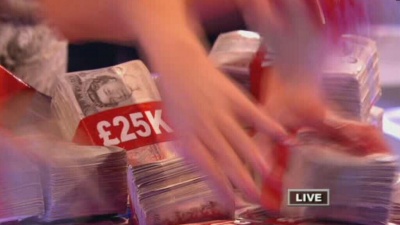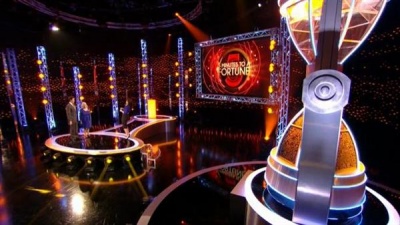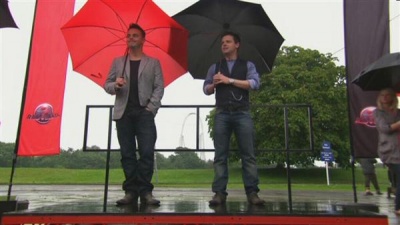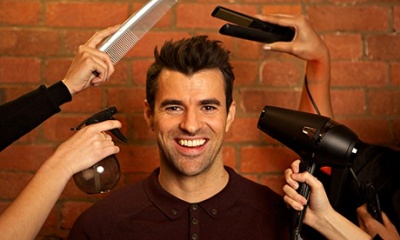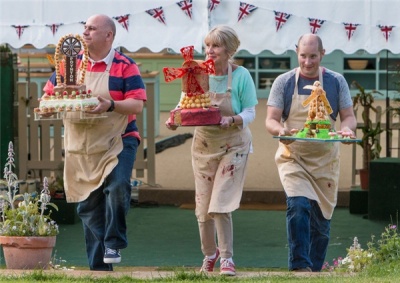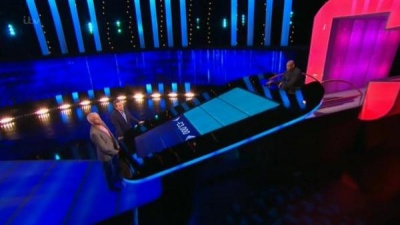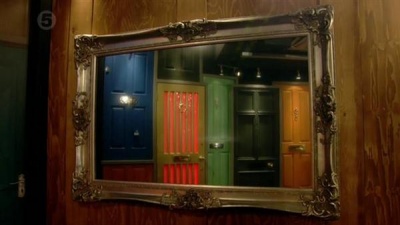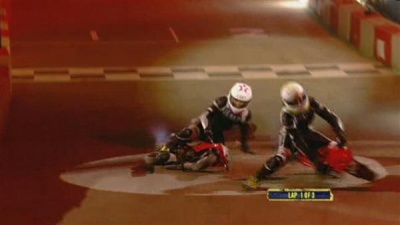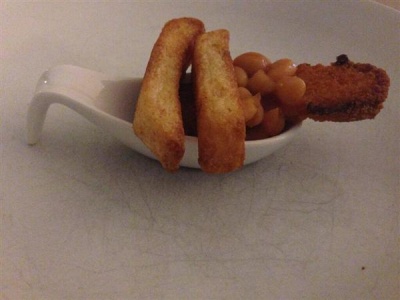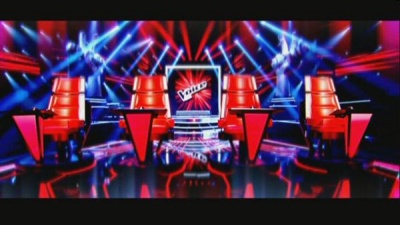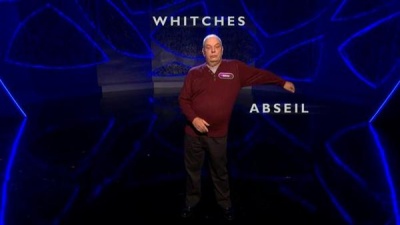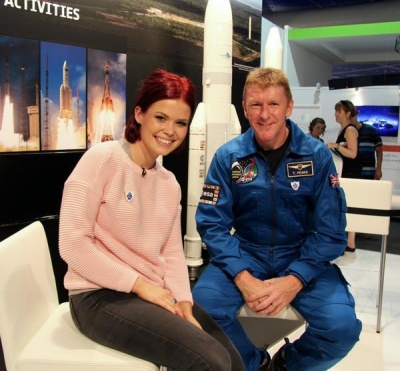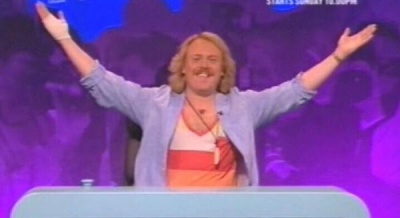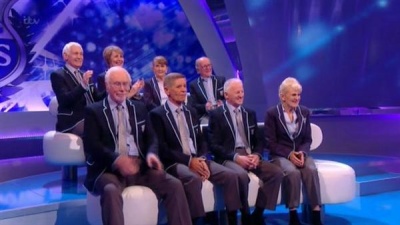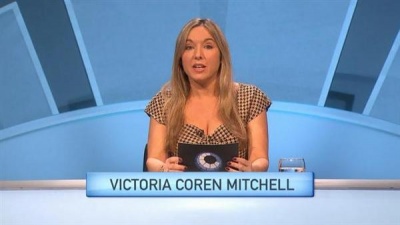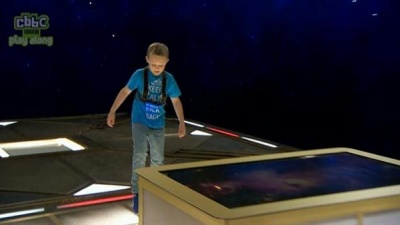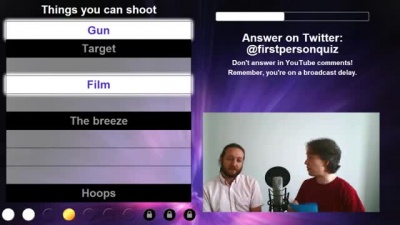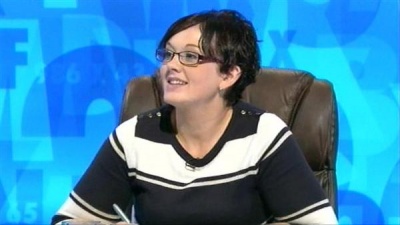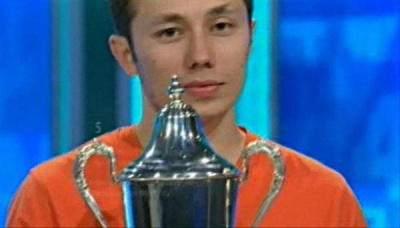Weaver's Week 2014-12-21
Last Week | Weaver's Week Index | The Week of the Year
We made it, folks. The end of 2014. Five years into the decade, and how much has changed? How much has not changed? This week, we're looking at some of the themes discussed in the 2009 series Weaver's Decade.
Contents |
"But we don't want to give you that!"
Even by October 2009, it was clear that the winds of change were blowing. The decade of casino capitalism had ended, shows no longer make a virtue out of vast prizes. Austerity and parsimony have been the watchwords of the 2010s so far.
Who Wants to be a Millionaire (1998-2014) limped on, but the format had long been emasculated. The show added a clock to put additional pressure on contestants to make the wrong decision, and used exceedingly difficult questions.
The Million Pound Drop Live (2010-) splashed the cash, giving each of its players One Million Pounds Cash, and letting them keep whatever they retained after eight demanding multiple choice questions. Hosted by Davina McCall, the show keeps its costs down by casting young people with poor general knowledge, and by making its final question an all-or-nothing gamble of utter obscurity.
Channel 4 has become the major network most likely to give away a huge amount of money. Deal or No Deal (2005-) is still on air, it now offers the chance to win £500,000 every single day of the week. By a curious coincidence, 500,000 is also the approximate number of viewers the show gets. We really don't see how this is a sustainable deal for Channel 4 or for the production company Endemol.
Channel 4 hasn't been afraid of high concept games for big prizes. It hasn't been afraid to try and to fail in the most spectacular fashion. The Bank Job (2012) was a real game, played in a real bank, handling real money, and built up real tension. But it deflated because George Lamb was trying to do live television, and neither the host nor the game was suitable for a live broadcast. The series began with an apology from the continuity announcer, and ended with the test card and a tone.
Five Minutes to a Fortune (2013) was a glorious series of miniature games, played in a studio with one hugemungous eggtimer. The show had ambition, setting the players unusual challenges they weren't prepared for. It had a big budget, offering almost £500,000 per week. And it had no viewers, the 5pm timeslot killed it deader than a very dead thing.
Before ending Millionaire, ITV tried to find a primetime replacement. But neither show worked: High Stakes (2011) suffered from Jeremy Kyle and a massive hole in the format, and The Exit List (2012) smouldered when it needed to burn.
ITV also suffered from the biggest flop of the decade so far, Red or Black? (2011-12). Series one filtered 1000 applicants down to one player, by a series of stunts on the road and in the studio, and culminated in a giant ball circling a giant roulette wheel live on network telly. Series two filtered 8 people down to one player, and finished in a giant ball dropping into a trap.
The show suffered from pedestrian direction, often missing the reaction shot because the screen was full of ball and wheel. And it was all about the star prize, even the finalist who got the last question wrong would leave with nothing. And the show was cursed with ill luck: the winner on the first show had been sent to prison for beating up his girlfriend. The winner on the final show to be recorded got his prize only after a steward's enquiry: the ball dropped while the colour was changing from red to black, and the hosts had to grovel on the doorstep clutching a cheque for £500,000.
Big prizes are offered on some of the UK's radio stations. For the last number of years, both Heart FM in southern England, and Magic in London, have run mystery voice competitions, asking listeners to identify three celebrities who spoke one word. These can drag on for months and months, boring the pants off of some listeners, keeping others hooked because they just might find out who spoke the middle word. Others call because they reckon they have the answer and can take £100,000 or more.
Over on the BBC, big prizes are only given away on the lottery shows. Who Dares Wins (2007-) and In It to Win It (2002-) remain regular commissions. They've been joined by the entirely fun Secret Fortune (2011-12) and the oh-so-tedious Break the Safe (2013-). All of these shows dangle £100,000 carrots each episode, all of these shows give away somewhat less per episode.
Daytime television has become notorious for its small prizes. The BBC started this trend with The Weakest Link (2000-2012), offering £10,000 and rarely giving away £3000. In this decade, the budget has shrivelled: BBC daytime shows like Perfection (2011-), Breakaway (2012), Beat the Pack (2013), Pressure Pad (2013-14) and The Link (2014-) have either guaranteed £2000 per episode, or dangled a five-figure sum and rarely given away more than £2000.
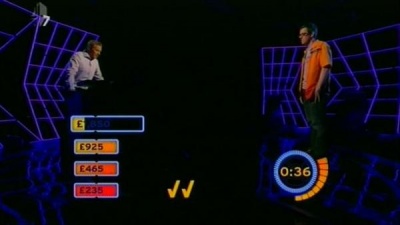 Is Tipping Point on the other side yet?
Is Tipping Point on the other side yet?
The nadir of this trend came on Face the Clock (2013), a Channel 4 daytime quiz with a top prize of £1500, and with rules that allowed a win of £175. C4 tried other shows around this time: 1001 Things You Should Know (2012-13) was light entertainment quizzing for a grand or two, and The Common Denominator (2013) was a cut-down connections quiz that did give away its £10,000 jackpot.
Bargain Hunt is still a regular fixture of BBC1's schedule, while Antiques Road Trip knocks around BBC1 daytime and BBC2 in early primetime. ITV has retaliated with Secret Dealers, Channel 4 offered Ultimate Dealer and French Collection, and CBBC had Trade Your Way to the USA. These are all different takes on the principle of "buy stuff cheap, work on it, sell stuff for a profit". Four Rooms dispenses with the front end, and concentrates on the selling: one object, four dealers, negotiation to find a high price but once it's gone it's gone for good.
Three two one bake
Once upon a time, this was "Who should be voted off the team?" Then we looked back and found the new decade has just about cut out backstabbing, and replaced it with altruism. Gone is the individualistic element, in has come a more collegiate celebration of achievement. Survival of the fittest in a hyper-competitive environment is so last decade, in the 2010s we've all been in it together.
Producers were slow to get the memo. Love Thy Neighbour (2011) tried to manipulate the people of Grassington into shouting at each other, but failed because the people of Grassington are lovely. Great British Hairdresser (2011) tried to find the best young fashion stylist, but failed because the show became all about James Brown (the hairdresser and racist) and not about the competitors.
Compare the failure of GBH with Hair (2014-). Another show looking for young hair stylists, but this was solid and substantial. The judges prized actual skills: being able to do unusual things with models' hair, to use a required element in a hairstyle. And they bothered to explain exactly what it was they sought, what would be a good haircut and a bad one.
Hair is one example of many process shows, in which contestants follow a set order of steps to complete a physical item. Many of these shows are to do with design, home improvement, and DIY. The Great Interior Design Challenge (2014-), The Great British Sewing Bee (2013-), Beat My Build (2013). The parent of them all is The Great British Bake Off (2010-).
Bake Off was one of many cooking formats thrown at the screen during 2010, and the only one to make any sort of impact. Who remembers, or cares for, Celebrity Pressure Cooker, Family Food Fight, Ten Mile Menu, Street Market Chefs, or Iron Chef UK? Bake Off is competitive, but it also celebrates the contestants' achievements. None of the other shows allowed us to get under the players' skin, to pick a favourite and root for him or her, week after week.
ITV had already tried to capture that emotional bond on Michael Winner's Dining Stars (2010). They tried again on Food Glorious Food (2013), in which four judges toured the country looking for their favourite dishes. The best went to Nom Camp and eventually to the Judges' Tummies. Any resemblance between this show and The X Factor is entirely deliberate, both were Simon Cowell productions.
Back in the world of quiz, the ultimate in lovely is Pointless (2009-), not least because host Xander Armstrong says "lovely" at least twelve times per show. Tipping Point (2012-) comes close: though it's competitive, and only one person can win, the players cheer each other on, whooping when the machine coughs up counters. Even though this makes it more difficult to win, everyone's willing each other on to win.
To a certain degree, we can extend this to cover courteous game shows. Resident quizzers on The Chase (2009-) do not want to lose: it's a point of personal and professional pride. There are tactics on both sides: will the player go easy or hard? Will the Chaser offer a zero amount, or even a penalty for getting back? Yet everything is done in the best possible spirit, praise is always offered where it is due, and teams know that they've beaten (or been beaten by) a great and honest player. Ditto on Only Connect (2) (2008-), where the questions are as hard as anything on network television. Great teams will be beaten by even better ones, and by questions designed to perplex and confuse.
For our money, the nicest quiz of the decade so far was Holding Out for a Hero (2011). Small local charities got a couple of minutes on primetime ITV, and could win £50,000 of prizes. The show was slow and ponderous, too slow to be recommissioned, and too saccharine to impress ever-cynical critics. It crossed swords with Born to Shine (2011), a show in which children taught celebrities new skills, and All-Star Mr and Mrs. The result was Big Star's Little Star (2013-), in which children answer questions about their famous parents, often embarrassing with their honesty.
Big Brother house, this is Davina
Reality shows have continued. Big Brother (2000-10, 2011-) has changed. Once upon a time, it was the joyous entertainment of the pantomime horse derby, entertainment highs and emotional lows. Then the show moved to Channel 5, tried to be the semi-scripted soap of The Only Way is Essex with actors who couldn't act their way into Neighbours. By 2014, Big Brother had become a snivelling, cowardly production, designed to stir up hatred, aimed at manufacturing rows and ill-feeling, manipulating player and viewer. It left us feeling icky.
ITV's I'm a Celebrity... Get Me Out of Here! (2002-) doesn't hide its intention: it's meant to leave us feeling icky. The autumn fixture has continued, it's there for three weeks each autumn and then they almost entirely forget about it.
ITV has had a good record in the sort-of reality genre: The Only Way is Essex happened on their watch, but that's not a game show however much Victoria Coren tried to pretend otherwise. They have given us The Cube (2009-), and had a breakout hit with the incorrigibly sexist Take Me Out (2010-). One of them involves people dicking about in a giant perspex container, and the other is hosted by Phillip Schofield.
More recently, ITV2 has tried to get involved with semi-reality entertainment productions. People don't watch Release the Hounds (2013-) for the athletic bits, but for a fright. People might watch Bad Bridesmaid (2014-) for the stunts, but it's mostly for the friendships formed.
There have been attempts to push celebrities to their breaking points. The Door (ITV, 2010) booked Frankie from the Saturdays and got rid of her as quickly as possible. Such wastefulness didn't bring the show back. Famous and Fearless (C4, 2011) put folk like Richard Branson's son and Her From Hollyoaks in an arena with Chris Evans, and bored them to death with time trials and mini-motorcycles.
That was one of Channel 4's many failures to have any sort of hit show. Since Big Brother stopped being interesting (first week of July 2010 seems to be the consensus there), Channel 4 has found successful entertainment shows thin on the ground. We've covered Love Thy Neighbour and The Bank Job. There was emotional honesty on Baggage. There was the Comedy World Cup, The Mad Bad Ad Show, Jewish Mum of the Year. When Was It Something I Said? turned out to be mildly entertaining, we chalked that up as a major success for the channel.
Then came The Taste, an effort to combine the process shows like Bake Off with the successful talent shows. It didn't work: 40% of the viewers tuned out after one episode, and the show dropped from "charming" to "repetitive" to "a chore" in nine weeks.
E4 has done even less well: its first successful game show origination was opening-night smash Banzai, and its last successful game show origination was opening-night smash Banzai. Remember Love Shaft? Tool Academy? Meet the Parents? My Little Princess? Of course not. E4's given up on efforts to make a good British game show, the channel's strength lies elsewhere.
Singing for Survival
Talent shows have continued. Winters are dominated by Strictly Come Dancing and The X Factor (both 2004-), with the BBC's dancing show proving more durable than ITV's rowing and singing show. All sorts turn up on Britain's Got Talent (2007-) in the spring, and Dancing on Ice (2006-14) popped up in the early months of the year.
The ice dancing ended this year, it hadn't overstayed its welcome badly, but hadn't offered anything new in many years. The run of Andrew Lloyd Webber casting shows also ended: Over the Rainbow (2010) was too bizarre for the BBC. Superstar (ITV, 2012) was quite the most bonkers primetime series we've seen all decade, seeking a new title character for Jesus Christ Superstar by means of the Peter Kay spoof Britain's Got the Pop Factor (2008). Judges included Dawn French, picked purely because she once played a vicar on television.
Lloyd Webber's replacement on the BBC were four revolving chairs. They were the stars of The Voice, a talent show where will.i.am and Tom Jones sat in judgement on the voices of contestants, hearing them sing without seeing them. For reasons no-one quite understands, the Incredible Spinning Chairs only ever appear in the first half of a series, the second half is an increasingly confusing series of knockout rounds, thefts, and live finals. At the time of writing, Becky Hill is the only Voice discovery to find any lasting fame, and she made little impression on series 1.
The annual Eurovision Song Contest (1956-) has continued, though we have yet to persuade a broadcaster to pick up the Junior contest (2003-). The Beeb has not picked up the revived Eurovision Young Dancers, and withdrew from Eurovision Young Musicians after 2010.
Many other shows have tried to show off talents. Dancers had So You Think You Can Dance (2010-11) and Street Dance Stars (2011-13). Choirs had Don't Stop Believing (2010) and Glee Club (2011-). There's even been a talent show for the cerebral, Britain's Brightest (2013) is best remembered for Connect Spelling.
Celebrities learning new skills to avoid a weekly elimination has been a regular trope. We've had Popstar to Operastar (reigning champion: Joe McElderry). We've had Tumble (reigning champion: Bobby Lockwood). We've had The Jump (reigning champion: Joe McElderry). And, as they say on Pressure Pad, many many more. Truth to tell, viewers are getting bored of celebrity skill musical chairs: BBC1 has asked for pitches for Saturday night, and has pretty much ruled out yet another format like this.
The Apprentice (2005-) spawned various imitators. Channel 5 made a number of programmes like The Boss is Coming to Dinner (2010) and Secret Interview (2013), television intrudes into the recruitment process.
The recruitment genre is best summarised in Blue Peter You Decide (2013), a casting programme to recruit a new star of children's television. It was a realistic job interview (a Blue Peter presenter's life is hard work) and tested the important skills (a make, an interview, working with children). The recruitment was twisted to fit pre-conceived ideas: the right number of people had to be eliminated at the right time, and the editor's hand was visible in some of the decisions.
We viewers never get to see the consequences of these recruitment shows: they end with the decision to hire or not. Blue Peter You Decide was a decision we had to live with. The viewers picked Lindsey Russell, who has turned out to be brilliant and phenomenal, and pushed her limits to climb every mountain.
Familiarity breeds contentment
Not every show we've seen in the 2010s has been novel. University Challenge (est. 1962) has not only continued, but has expanded its popularity. Mastermind (est. 1972) has continued, in spite of the scheduler's best efforts. Countdown (est. 1982) is still on air, and still offers intense competition. Aughts faves Eggheads, Deal or No Deal, Bargain Hunt, Dickinson's Real Deal, all these are still in production.
Total Wipeout (2008-13) influenced many shows in the early part of this decade. ITV tried to replicate the People Doing Silly Things And Getting Mildly Hurt vibe on The Whole 19 Yards (2010), but that show never caught fire. The BBC tried to replicate the Take People To Argentina For Filming vibe on 101 Ways to Leave a Gameshow (sic) (2010), but that was too slow. To compensate, they sent the Top Gear crew round (2014), and that ended in a very swift exit.
ITV also tried Sing If You Can (2011), inflicting minor cruelty upon slightly famous people, and with the Keith Lemon character hosting. ITV has been desperate to find a major vehicle for Leigh Francis's comedy creation, over and above his work on Celebrity Juice (2008-). Sing If You Can didn't take off, and LemonAid (2012) was as confused and disorganised as Bruce Forsyth's Big Night. A revival of Through the Keyhole (2013-) proved enough to give Keith a primetime hit. Just about. That's if you squint and don't pay any attention to the fact it's usually as popular as University Challenge.
By 2013, ITV had renewed its schedules with many old programmes. Famous Family Fortunes had never been away, and All-Star Mr and Mrs was an annual fixture. Because Ant and Dec had had a couple of relative failures, the network brought back Saturday Night Takeaway (2013-). To keep Stephen Mulhern on screen, they added Catchphrase (2013-), and this year made a new run of Celebrity Squares (2014-). Channel 4 reversed its policy of not bringing back old shows, it's made new editions of Fifteen-to-One (2013-), though this owes more to the channel's desperate flailing for daytime viewers.
There have been a few new family shows. BBC1 tried Epic Win (2012) and That Puppet Game Show (2013-14), but neither went anywhere. ITV showed Amazing Greys (2014), a challenge of young versus old, but it again didn't quite catch on. And there was Keep It In the Family (2014), featuring grannies and children and famous stars and riddles and prizes. There's certainly something to be said for this show, and we don't know if it's coming back.
"How much can I get for my gum wrapper chain?"
This week, people all over the world found the result of Serial. The audio show, distributed over the internet, has been a huge word-of-mouth success. The newspapers have been full of nothing else, fans have paid for the next series, and the show is already influencing broadcast radio. Not bad, for a podcast. Especially as podcasts were meant to be dead by now.
At the end of 2009, we discussed "interactivity" in the past tense. Broadcasters had let viewers write the story, found it far too difficult to control, and rowed back to ways they understood. We were hasty to say that viewers no longer took control.
First came the microbloggers. It became possible for viewers to voice their opinions about what they were seeing on the telly. Much of the time, this comedy heckling was to let off steam, like Statler and Waldorf in the theatre box. Sometimes, Kermit and the producers would use this feedback in later episodes. We noticed this on The Million Pound Drop, where the pace picked up from night one to night two, and the trays grew for the second run.
Then came social viewing. Only Connect grew from a niche show to a mainstream success, partly because the show had attitude and swagger, and partly because the fans talked to each other during the broadcasts. Gathering for Only Connect parties needs planning; #OnlyConnect arises spontaneously, and we're just waiting for the first question directly inspired by the online conversation.
Social viewing has grown. Splash! (2013-14) may have been recommissioned because it worked well online. The Jump is set to come back because it worked well online, it brought lots of young viewers to Channel 4. Release the Hounds grew past a pilot because it worked well on social media, and sold overseas because horror is an international language of screaming. (We note that Hounds is to have a dedicated filming base in Lithuania, just as Total Wipeout had Argentina and Fort Boyard has its fort.)
Interactivity has grown a little, it's now possible to design a way for viewers to play along at home. Channel 4 again led the way, Was It Something I Said? (2013) let viewers join in the conversation by hashtags, with the promise of extra footage just for taking part. Boom Interactive has made some simple appalong games, for Y Lifft (2012-13), Ludus and Pyramid (both 2014-), which could contribute to a series leader board and serious prizes.
In the last year, there have been tentative steps towards shows decided on social media in real time. The broadcasters' holy grail, because it's impossible to participate unless you're watching live, and if you're watching live you have to watch the adverts in real time. The Singer Takes it All (2014) was cheap and unremarkable summer filler, but it served two purposes: it demonstrated that appalong shows could work in real time, and it made the idea of real-time singing shows look very tacky indeed. That saved us from a greater threat, Rising Star had been a flop across Europe and could have made an equal mess of ITV.
The internet has made it possible for viewers to watch foreign programmes, and to make and distribute their own shows. Some people saw Avanti un Altro in Italy, and made versions of the end game. 21 Questions Wrong (2012-13) followed the original exactly, 20 Questions Wrong (in Edinburgh Nights, 2013-) was simpler for the casual listener to follow. Schlag den Brig (2014-) is a contest in the style of Schlag den Raab, played between two super-competitive heroes. There have been revivals of Knightmare, made for the web and as a theatre production.
The nexus of all this interactivity was First Person (2014-), a home-brew game that had to be seen live, and that required the audience to play against the studio contestant via the internet. It's the most interactive show we've seen so far.
By the time we write the story of the decade, will First Person be a stepping stone to bigger things? We will have to see.
Countdown Finals Week
Antoinette Ryan was the champion at the start of the month, scoring 859 points in her octochamp run. Seven centuries in that run was enough to make her second seed. Jacky Pinkey won a game, Andy Noden made 12 maximum scores in his win, and he'll pick up his challenge in the new year.
Which brings us to Finals Week, which began with the quarter-finals. Dan McColm, the top seed, took the lead in his first round against Paul Worsley, and the final score was 109-60. Antoinette Ryan was always ahead of David Stanford, his habit of offering plausible but wrong words cost him another game, allowing Antoinette to win 82-65. Laurence Killen triumphed by one point against Tricia Pay, 98-97; her offer in one letters round was not valid, and this proved the difference in a high-quality show. A see-saw match between Mark Davies and George Ford resulted in George claiming a victory. The difference was a series of risks in the middle order: Mark missed the third numbers, and offered "montaged", George hit with RECITER to retain his lead.
Dan took on George in the first semi-final, and the question in round 2 was "is SPEARGUN valid?" Dan risked it, scored with it, and opened up a lead. George had to risk "puttie" in round six, and that lead opened up. RIBOSOME forced George into another error, and after nine rounds, Dan was doing very well – 75 points possible, 75 points scored. ANIMATO is a term in music, Dan spotted it, and kept up the pace. VELETA, a dance, is "the riskiest six of all time", and it's in.
And still no points dropped. Is SPEARGUN valid in round 12? As valid as it was half-an-hour ago. Dan spots ROUILLE after about ten seconds, and knows it doesn't stem with I or X. The fish soup means Dan has achieved perfection on the letters. What is, at this level, a simple four-large numbers game means Dan has scored 40/40 on that segment.
Which just leaves the conundrum. "Yesthingi". After eleven seconds of concentration, Dan buzzes to say "Hygienist". It's correct! It's right! It is, for only the fifth time in Countdown history, a perfect game!!!!
And then came the second semi-final. Any hope of a perfect game vanished when both Antoinette and Laurence missed "Creatures" in round two. Not that this was a poor game – Antoinette won with "Aileron" halfway through, and "Soakage" in the last letters game. Neither player had a disallowed word, both were equal on the numbers games. The conundrum evaded both players, and Antoinette had won by 102-88. The raw score reflects the tense show: 102-99, the odd points in 201.
So, the final was between Dan McColm and Antoinette Ryan, the two top seeds. Normal service continued, Dan won round two with an obscure plant, the maximum game went in round four when he missed "Legacies". Perhaps the pressure was telling: Dan completely blobbed the second numbers game, and trailed as David Baddiel delivered a bad joke.
It didn't last long: Antoinette's risky word in the next round wasn't in the dictionary, and she fell behind. The gap grew again when Dan solved the third numbers game to perfection, and moved further ahead when "andovers" proved not to be in the dictionary. What DJs do are "handovers". ORGANISER is the final letters offering from both players.
20 the gap, 20 to go, Antoinette pulls up six-small, but it's Dan who pushes his pen down after ten seconds. He adds the conundrum to make the final score 117-87.
This Week and Next
On University Challenge, Liverpool beat Glasgow by 170-105.
Only Connect began with a player solving a Rubik's Cube in under 20 seconds. We're looking at the Radio Times from 1980, when the world record was 33 seconds, set on Multi-Coloured Swap Shop. These days, 18 seconds is a throwaway remark on an intellectual game show.
It's the Orienteers against the Gamesmasters this week. Two for the Orienteers on cornettos, one for the Gamesmasters on The English Diseases. One for the Orienteers on Established 1948, and a pre-emptive warning against pedants who think that "Hells Angels" takes an apostrophe. People who think that have another thing coming: it's on a motor bike and doesn't look happy.
"They advised Buffy the vampire slayer" is the Gamesmasters' answer to the picture quiz. It's actually makers of tennis equipment, a bonus for the Orienteers. They add another from the music round, four pieces about fireworks, stretching from Handel to Katy Perry. Two eesy points for the Gamesmasters, on things symbolised by ee. 5-3 to the Orienteers.
There's a bonus for the Gamesmasters on the first players to reach multiple centuries in Test cricket. Butler and Kennedy? We're not talking Willow's dates in Buffy, are we? No, 2nd is Hamilton, and it's the dates (and surnames) of Scarlett O'Hara in Gone With the Wind. Neither team knew that, and neither team knew that an ISBN ends in a check digit. Did Richard Hamming-Distance die in vain?
Pictures for the Gamesmasters: Simon Mayo, James Galway, Cork House, so we're finishing with Dion Dublin. Except we're not: it's Clare College, and works down to Limerick. That goes over to the Orienteers for a bonus. Seasons in Italian give three points to the Orienteers, and nothing on a representation of "California girls", the Beach Boys song that no-one knows. 9-4 to the Orienteers.
Some catching up for the Gamesmasters, who kick off with people who give their name to bits of the body. There are islands in the Med, there are snakes in fiction, and is the fourth group words associated with palindromes? It is. Ten points!
Orienteers need to make a move here. They get "and the ____" backing singers, people who gave their name to medical syndromes, time indicators, and homophones for things to carry water. A round set in Black Country dialect, equating "your" and "ewer". Ten points!
19-14 to the Orienteers. Novels from 1945 go to the Gamesmasters by 3-0, then Worth Five Points is a 2-2 split. Same Spelling, Different Pronunciation sees points added and lost all over, ending with Gamesmasters 19, Orienteers 22.
A high-scoring contest on Mastermind this week. It was won by the contender last after the specialist subjects. Alan Gibbs took One Hit Wonders 1960-2000, and it was clear the definition is "one big hit". We claim nine, Alan made 11 (0). He went like the clappers in his second round, snapping out an answer as soon as Humpo had shut up. Very often it was the answer, he stormed to 27 (0).
A sneeze behind was Marianne Fairthorne. She told us about Empress Livia, wife of Augustus Caesar. We knew nothing, she knew all the answers. All? No! One indomitable question remained, 14 (0). Her general knowledge round was good, but wobbled a bit in the middle. The contender took a moment to hear her score, 27 (2). We'd be amazed if she didn't come back as a high-scoring loser.
Also this week: Chris Baker answered on UK General Elections 1979-2010. Not entirely sure it's sporting to ask after MPs who died before the election was called. We watch far too much history on The Parliament Channel and claim 12; Chris made 13 (1). Second round started strongly, fell away at the end, to finish on 24 (4). Stephen Jones played with the History of West Bromwich Albion FC, a team founded in 1989 and currently playing in the Premier League North. The round only asked about the men's team, and Stephen was one away from perfection: 13 (0). His second round never got out of second gear, 20 (0).
BARB ratings in the week to 7 December.
- Strictly Come Dancing 10.95m, I'm a Celebrity final 8.9m. There can only be one winner.
- The X Factor is falling: 7.1m for the results, 6.25m for the performances. Compare to The Apprentice (an appropriate 6.66m) and Pointless Celebrities (5.9m).
- Pointless daytime has cracked BBC1's top 30, pulling in 3.9m on Friday. That's more than anything on BBC2: Masterchef The Professionals (3.55m), University Challenge (2.85m), The Great Interior Design Challenge final (2.1m), and far ahead of The Chase (2.95m on Wednesday, 2.85m on Saturday).
- 1.57m for Get Me Out of Here Now on ITV2, 990,000 for Coach Trip on Channel 4, and 425,000 for Top of the Pops '79 on BBC4.
- A changing of the guard at More4, where repeats of Four in a Bed (285,000) prove more popular than Come Dine with Me (263,000). It's the first time this decade that Come Dine repeats haven't been More4's top game show.
Coming up this week: finals of The Apprentice (BBC1, Sun), and Masterchef The Professionals (BBC2, Tue). The usual specials of Celebrity Mastermind (BBC1, from Sun), Fifteen-to-One (C4, Tue), Fighting Talk (Radio 5, Thu), 8 Out of 10 Cats Does Countdown (C4, 29 Dec), Come Dine with Me (C4, 30 Dec).
Strictly Come Dancing is at 5pm on Christmas night, The Big Fat Quiz of the Year is at 9pm on Boxing Day.
Two new series on the wireless: Britain Versus the World (Radio 4 Extra, Mon), and Brain of Britain starts with Brain of Brains (Radio 4, Mon).
Win Your Wish List (BBC1, Sat) is a new lottery show. There's a 50-year retrospective of Sion a Sian (S4C, 30 Dec), and a 10-year look back at The Big Fat Anniversary Quiz (C4, 2 Jan).
We note that Ejector Seat, The 21st Question, and Who's Doing the Dishes? all get repeats on ITV on Saturday 3 January. Normal service is resumed by then: viewers in Ireland get The Algorithm (TV3) and in the UK there's Take Me Out (ITV).
The Week will return towards the end of December with a review of the year, and we plan to resume normal weekly service on 11 January. Until then, our best wishes for a happy Christmas, for a memorable new year. And good games to you.
Photo credits: Remarkable Television and Initial (both Endemol companies), Victory Television, Syco, ITV Studios, Objective Productions Scotland, BBC Documentaries London, Love Productions, Princess Productions, CPL Productions, Wall to Wall, Talpa, RDF Television, TalkbackThames, Lindsey Russell, Eyeworks, Presentable, Boom Pictures, Cube Interactive, Tom Scott.
To have Weaver's Week emailed to you on publication day, receive our exclusive TV roundup of the game shows in the week ahead, and chat to other ukgameshows.com readers, sign up to our Yahoo! Group.

